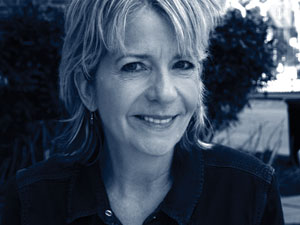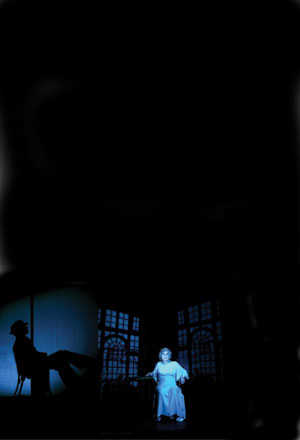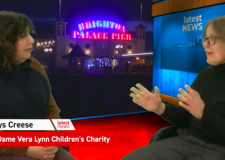Brighton Festival: Finding Lucia
Sharon Fogarty writer and director talks to Andrew Kay about the creative process involved in making Lucia’s Chapters of Coming Forth By Day with New York company Mabou Mines

What inspires you and what drives you forward creatively?
To quote my friend and colleague Liza Lorwin, “The process is the romance.” I love the process of discovery through long-term collaboration with extraordinary artists. When the music, visuals, text and acting combine to create a sublime and multi-layered experience for the audience… it’s exhilarating to experience the fruits of collective creation.
What is the starting point for you in any new piece of work?
It’s often something that I’ve read and can’t stop thinking about. For Lucia’s Chapters, it was Brenda Maddox’s book Nora that obsessed me for a while. The obsession then becomes a puzzle to solve, a mystery to unravel.
Research must play a large part in the way you create a piece. Do you find that confining creatively?
The research was very important for this piece, however the task of transforming the research into something performable and audience worthy is probably the most difficult part. I don’t think there is a formula per se, though time and good collaborators help. A painter friend of mine would put his brush down for the day only to check the next morning to see “if the painting had survived the night.” Time is a partner in that way. Having time to sit with your choices and see which ones survive over time is an important part of the editing and shaping process.
Does research into a character like Lucia Joyce or indeed any real character become obsessive or indeed need to become obsessive?
I suppose so. Lucia’s story is compelling however at a certain point we had to find an artistic “way in” or a “hit” in order to create a context for our piece. In turn, that becomes the obsession and all the material culled from research serves as the ingredients to make the work.
I find when I am watching theatre that I can become totally drawn into a character’s world. Does this happen when you are creating a work?
Absolutely, that’s what I yearn for. Giving Lucia a voice was important to me. It seemed to me that because of her illness, her existence was all but erased. I sought to give her a voice. Her archive showed evidence that she wanted to be known as an important person especially, as she put it, “as the daughter of the famous Irish writer, James Joyce.” Lucia shows up very clearly in Joyce’s most experimental novel Finnegans Wake with many names and identities including Nuvoluccia. For me, Lucia’s unique, real life mixed-up language and her guileless view of the world can be seen as a model for this character, and for that matter, the entire book.
How much space do you allow yourself to fictionalise a character?
We wanted to create a poetic homage to Luica. So our story is fiction, inspired by her real life events and writings. We also included characters in Finnegans Wake by taking a prismatic approach – to get the full picture of Lucia, you have to look at her through two lenses, her own peculiar skewed point of view and Joyce’s equally peculiar point of view in his novel.
Does invention allow you to fill gaps that you find in your research, or do you stick with the truths that you uncover and leave the rest alone?
There were a lot of gaps to bridge and while we didn’t want to fill them with made up information, we did invent a context that would serve as a metaphor for her tragedy. In nearly all of Lucia’s letters, she begs to be taken out of the institution, she complains that she had been left or forgotten there and wants to go back to Paris, or Zurich or Dublin. She was desperate to leave, yet incapable to go anywhere or function on her own. So, for the nearly fifty years she spent in institutions she was metaphorically “dead”. I wrote Lucia’s first line, “Bad news, I’m dead,” placing her in an imagined “afterlife,” a purgatory of sorts, where she eventually finds rescue through her father, and her legacy is best understood through her literary reflection in his wild and impossible book Finnegans Wake.
What balance do you like to find between art and entertainment?
I want the audience to have fun! Our job is to entertain, even with tragedy. I actually find Lucia quite entertaining and often very funny! I also found her behavior at times “crazy like a fox.” She was in institutions long enough to know how to play with one’s expectations of madness, so that at one moment she might say something that seems foolish yet could also be a veiled razor sharp criticism.
Audience response is important, but how important is it to you?
The audience is everything. I try to see the work in two dimensions as a director, through the performers journey, and as their audience by asking “do I understand and connect with their journey.” Both the artist and the spectator are interdependent, and it’s my hope that through the performance they share a deep connection. I love actors who offer freely their fearlessness and intelligence. Live theatre allows for the unpredictable synergy between the actors and audience.
When casting Lucia’s Chapters how difficult was it to find the right people, and having found them is it hard to recast for different productions?
Lucia’s Chapters was created in collaboration with Mabou Mines’ Co-Founder Ruth Maleczech as Lucia. Several months after her final performance in Oslo in 2013, Ruth passed away. She was a fierce and defiant Lucia with a Vesuvian anger simmering beneath. Ruth was always quick to suggest though, that someone else play the part, so I feel it’s good and fitting that Maria Tucci take on the role. Maria is a celestial actress with a keen feel for Joyce’s poetry, and having played a lot of Tennessee Williams, an understanding of the fine line between sanity and madness.
As a collective, Mabou Mines has a loose confederation of actors who work with the company regularly. Since our process is highly collaborative, roles are developed for and by the performers who sometimes play a role for more than 10 years.

In the creative process did you find any parallels to your own life, being surrounded by artists perhaps… ?
What I find rather frightening about Lucia’s story is that her initial institutionalization seemed to be due to her rebellion against the expected conventions of her as a woman. Was that significant in tipping Lucia’s sanity? And in what ways are rebellious women punished for their rejection of conventional norms especially women artists who often look at the world in opposition to the norm. I am fortunate to work (in not so normal New York) within an artistic community that supports acts of artistic rebellion.
Where is your creative force taking you next?
We’re working on a new adaptation of Goethe’s Faust Part II. Faust and Mephistopheles join forces to create wars for personal gain, while colonizing people and abusing the earth/ecosystem. We aim to, in the Brechtian sense, ask our audiences to think about the systems and principles that we live by. We want to question the Faustian bargains we make everyday as First World citizens. Faust 2.0 will premiere in New York in autumn 2016. Thu 7 & Fri 8 May, 7.30pm, Sat 9 May, 2.30pm & 7.30pm at the Theatre Royal Brighton




















